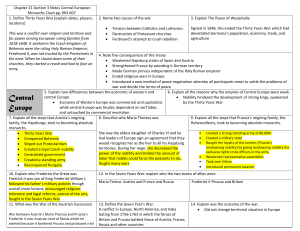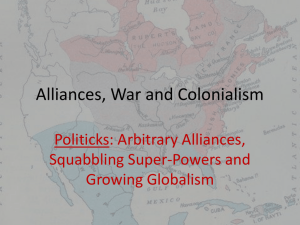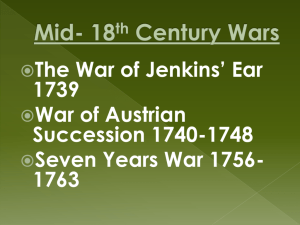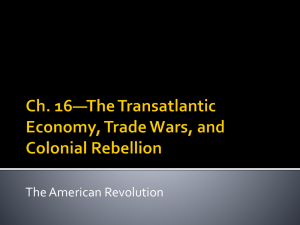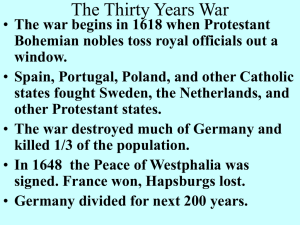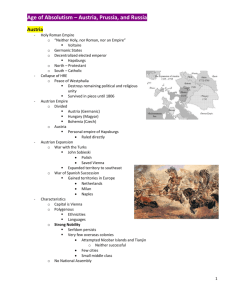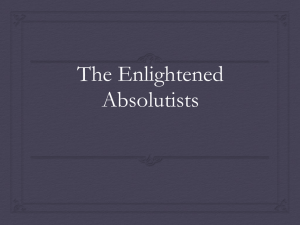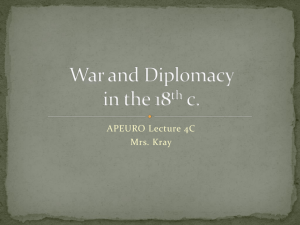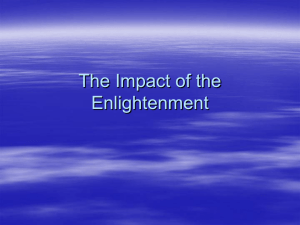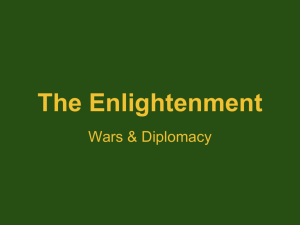Chapter 18 - Avon Grove School District
advertisement
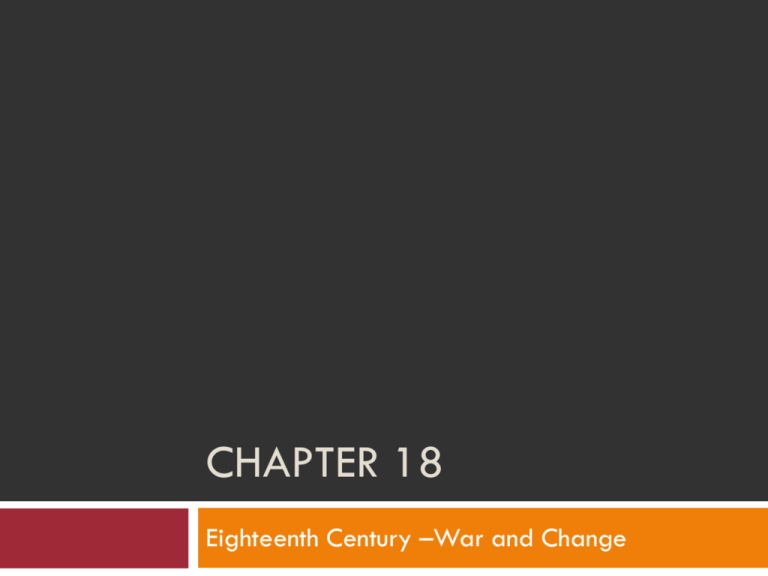
CHAPTER 18 Eighteenth Century –War and Change What is Enlightened Absolutism? Enlightenment brought about ideas of unchangeable privileges that shouldn’t be withheld from anyone monarchs rule while allowing natural rights to speech, religion, etc France Saw an economic revival as Enlightenment grew Louis XIV left France with enormous debts Louis XV was lazy and weak More inclined to spend time with Madame de Pompadour Louis XVI (XV’s grandson) married Marie Antoinette Not capable of fixing economy Marie denied as a wife and falls into court intrigues Great Britain United Kingdom of Great Britain -1707 England and Scotland United British refers to English and Scots Parliament Makes laws, levies taxes, passes budget St George, England Dominated by landed aristocracy St Andrew, Scotland – House of Lords Life position – House of Commons Great Britain St Patrick, Voting varied widely, wealthy able to use patronage- bribery to gainIreland control of boroughs and counties United Kingdom 1802 Great Britain 1714- Queen Anne, last Stuart ruler, died Crown offered to Protestant rulers of German state of Hanover George I (1714-1727) Didn’t speak English George II (1727-1760) Had no familiarity with British system, chief ministers handled Parliament William Pitt the Elder (PM) won Canada & India during 7 Years War George III (1760-1820) Occasional bouts of insanity, replaced PM William Pitt the Elder and angered the People and the Parliament after losing Americas Decline of the Dutch Economic Decline Infighting between regents and the House of Orange Burghers – calling themselves Patriots- wanted democratic reforms Prussian troops came to protect the monarchs Prussia- rise of army and bureaucracy Frederick William I (1713-1740) General Directory Supervised military, police, financial affairs Code: obedience, honor and service to the king Closely supervised by Frederick William Strict class stratification Nobility & landed aristocracy “Junkers” Still had large estates with serfs Junkers had monopoly on officer corps of army Prussia- rise of army and bureaucracy Army – 4th largest behind France, Russia, Austria Nobility as officers created a close bond between two Prussia was an “army with a country” Frederick II “the Great” (17401786) Best educated & cultured monarch Invited Voltaire to live at his court Single code of laws for territories No torture Limited freedom of speech, press, religion Enlarged military further and used it! Catherine the Great Pugachev’s rebellion German princess (1773-1774) Believed in philosophes but knew she would independent tribes ofif alienate the nobility warriors she implemented reforms Volga valley and South like Joseph II Russia Strengthened the Pugachev betrayed by landholding at his own men,class tortured expense of serfs and executed Catherine responded by extending serfdom Poland 1772-1795 Polish king elected by nobles thus restricting his power Instead of fighting with each other, Austria, Russia & Prussia divided Poland After the heroic but failed Rebellion under Thaddeus Kosciuszko Austria & the Habsburgs Maria Theresa 10 surviving children Divided Austria and Bohemian lands into ten provinces, subdivided into districts Administered by royal officers making more centralized government Enlarged military Austria & Habsburgs Joseph II Driven by reason Abolished serfdom, gave serfs hereditary rights, outlawed death penalty, equality before law EVERYONE found issue with reforms Alienated nobility & church Serfs couldn’t understand new laws “here lies Joseph II, who was unfortunate in everything he undertook” Successors undid everything he accomplished Prussia, Austria, Russia, Britain, and France dominate in what area were they most likely to compete for land and power? War of Austrian Succession (1740-1748) – allowed Maria Theresa to take the Austrian throne Frederick II of Prussia took advantage of Maria Theresa taking the throne by invading Silesia France entered to take advantage of Austria’s weakness War of Austrian Succession (1740-1748) Maria Theresa allied with Great Britain France took Madras in India from British, Brits took French forts in America Peace Treaty of Aixla-Chapelle returned all land but Silesia Seven Years War (1756-1763) Maria Theresa planned revenge by building her army and by separating Prussia from France (mean girls unite!) Britain & France rivals over colonies Austria & Prussia hate each other France abandoned Prussia and joined Austria So did Russia Great Britain sided with Prussia New War fought in Europe, India, and North America 7 Years War VERSUS 7 Years War VERSUS War in Europe British & Prussians vs. Austrians, Russians, French Frederick the Great able to defeat Austria, Russia, France… But he was gradually worn down from surrounding powers Tsarina Elizabeth of Russia died, Peter III admired Frederick the Great and withdrew, ending the war Peace of Hubertusburg 1763 All occupied territories returned Austria recognized they lost Silesia War in India “Great War for the Empire” Robert Clive (17251774) won the battle for the Madras Treaty of Paris, 1763 French withdrew and India remained under the British “French and Indian War” Two areas of contention Waterways of Gulf of Saint Lawrence Forts of Louisbourg, Great Lakes, Lake Champlain Ohio River Valley French moved South from Quebec, North from Louisiana along Mississippi, cutting of British expansion England felt they must destroy French colonial empire if they will grow concentrated on American theatre “French and Indian War” French had greater numbers British won decisive naval battles Treaty of Paris (1763) France ceded Canada and lands East of Mississippi Spain (France’s ally) gave up Florida France gave Louisiana to Spain European Life Seminar Points for participation How did armies change between 1740-1780? French 190,000 300,000 Prussian 83,000 200,000 Austrian 108,000 282,000 Russian 130,000 290,000 What was the composition of the armies? Officers from landed aristocracy Middle class not allowed in higher ranks Rank-and-file soldiers came from lower classes Because peasants were needed in fields, many hired soldiers from Switzerland and Germany England didn’t have a standing army Britain and Dutch built up navies Why didn’t bigger armies lead to more war? Europe was less driven by ideology like during religious period Ideological wars are more violent and destructive Armies depended on tax money so monarchs were loathe to “spend” that investment Costliness of war and technology created barriers How did child-rearing change? Childhood began to be viewed as a phase of human development Children dressed in more comfortable cloths Primogeniture- treating son better – came under attack Toys specifically for children appeared Changes limited to nobility Infanticide and abandonment common in lower classes How did agriculture change? New plants replaced leaving fields fallow Alfalfa, Jethro Tull invented a seed planter in rows Potatoes and corn Potato turnips, clover return nitrogen staple of the poor Large landowners enclosed old open fields Led to demise of village farming, small farmers became tenant farmers How did finance change? Public and private banks and acceptance of paper notes made expansion of credit possible Bank of England (1694) – made loans “banknotes” issued giving credit Government bonds paying interest created notion of “national debt” outside of monarchy We can now raise more for militaries How did Industry Change? Cottage Industry- textiles were produced by “putting out” or “domestic” system where rural workers would work raw materials in their home Cotton from slave labor increased production and led to innovation Trade increased with new world

